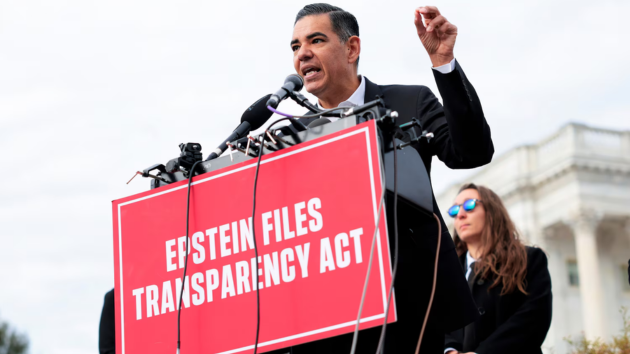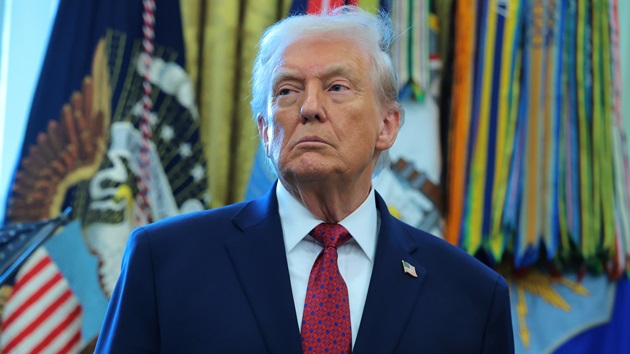A partial government shutdown could happen next week. Here’s what you need to know
Written by ABC Audio All Rights Reserved on January 12, 2024

(WASHINGTON) — The next week in Congress will be consumed by efforts to keep the lights on as Congress — for the third time in the past year — is running up against a funding deadline that could lead to a government shutdown.
With each looming deadline, the stakes grow higher and the politics more winding.
Here’s a quick catch up on where we are, and what’s at stake, a Friday’s funding deadline looms.
When is the government slated to shut down?
This upcoming funding deadline is unlike others we’ve seen because there are two different looming deadlines. This is because of the way House Speaker Mike Johnson crafted the last short-term bill that has been funding the government since mid-November.
The government is funded through 12 individual spending bills. When Congress needs more time to pass them, they often use a stopgap measure to bump back the expiration deadlines for all 12 of those bills.
But in November, Congress split them up.
So, on Friday, Jan. 19, funding will run out for programs under four of the 12 bills: Agriculture, Energy and Water, Military Construction-Veterans Affaifs, and Transportation-Housing and Urban Development.
If Congress doesn’t act to extend funds for those four bills by Friday, there will be a partial government shutdown.
Programs under the other eight bills, including defense spending, are currently slated to run out of funds two weeks later, on Feb. 2.
So what is Congress going to do to try to avert a shutdown?
This Congress, Republicans made it a goal to try to return the government funding process to regular order by passing the 12 appropriations bills individually. They’ve missed their deadline to do it twice, and are coming up on a third.
As was the case with the last two funding deadlines, the four bills that are running out of funds aren’t ready to be voted on yet, and Congress won’t be able to pass them before Friday. So increasingly, the Senate has signaled it’s going to once again aim to buy itself some additional time by punting the funding deadlines with a stop-gap measure.
On Thursday, Majority Leader Chuck Schumer teed the Senate up to take a procedural vote on a bill that would move the funding deadline when it returns to Washington on Tuesday. Senate Minority Leader Mitch McConnell said Congress would “obviously” have to pass such a measure to keep the government open while lawmakers continue to toil over the final versions of appropriations bills.
It’s not yet clear how long of an extension the Senate will seek, or whether the stopgap bill they aim to push through this week will affect the four bills expiring on Friday or all 12.
What’s also unclear is whether Johnson is prepared to get his wily conference in order to move a stopgap measure through the House, where it’ll be a harder-fought battle.
Johnson previously said he would not approve any additional short-term funding bills, but Johnson also said he does not want the government to shut down next week. Given the crush that Congress is now under, he’ll likely have to make a choice.
It should be noted that a small contingent of Republicans are actually advocating for a shutdown. Because of the razor-thin Republican majority in the House, if Johnson does move on a short-term spending bill, he’ll need the help of House Democrats to pass it.
But wait, I thought a government funding deal was reached. Why won’t that stop a shutdown?
There was a pretty significant breakthrough in negotiations over full-year spending bills on Sunday. While a major step forward in getting the government funded, that deal won’t be done and dusted by Friday’s funding deadline.
Still, the deal, announced jointly by Schumer, Johnson and House Minority Leader Hakeem Jeffries, tees appropriators up to finally complete their work after months of squabbling between the House and Senate about how much all of the 12 government funding bills should cost.
The deal sets top-line spending for fiscal year 2024 at $1.65 trillion, the amount originally agreed to by President Joe Biden and then-House Speaker Kevin McCarthy during negotiations over the government’s debt limit last year. It preserves amounts for both defense and non-defense discretionary spending that Biden and McCarthy agreed on.
The question now is how long it will take appropriators to turn that handshake agreement into bills that can be voted on and passed. It’ll certainly be longer than the week until a partial shutdown.
In the days since the deal was agreed upon, Democrats have been touting it as a home run for their priorities that beat back GOP efforts to exact spending cuts.
“Both parties reached this agreement without resorting to the painful and draconian cuts that the hard-right, particularly those in the Freedom Caucus, clamored for,” Schumer said on the Senate floor earlier this week. “The hard-right wanted to put a chopping block on programs that helped millions of Americans.”
Johnson, meanwhile, has emphasized what he sees as wins for Republicans in the deal: claw-backs of about $6 billion in COVID-19 relief funds and an expedited $10 billion cut in funding to the IRS.
The speaker said the deal would allow Republicans to continue to fight for “conservative objectives” to be included in spending bills, but Schumer has vowed to push back on those “poison pill” additions.
How are Republicans reacting to that deal?
This doesn’t look great for Johnson.
After the top-line spending deal was announced last week, Johnson’s hard-liners were out in force bashing the deal for failing to exact the steep cuts to the federal budget they had hoped to secure.
In a closed-door meeting on Thursday, many urged the speaker to renegotiate the deal, but Johnson ultimately stood by it.
“Our top-line agreement remains. We are getting our next steps together — and we are working toward a robust appropriations process. So, stay tuned for that to develop,” Johnson said.
The move has been enough to anger his right flank, creating a potential vulnerability for Johnson. Former Speaker McCarthy was ousted from his position atop the conference for taking similar moves to keep the government open without demanding spending cuts.
There does not seem to be as much of an appetite from House Republicans to dethrone Johnson this time around. He’s been in the role for less than three months.
But Johnson will likely have to do something to regain favor with his most right-leaning members, or he could face some sort of repercussion.
What about the southern border and Ukraine aid?
Congress has for months been negotiating over border policy changes in hopes that an agreement over them will unlock Republican support for additional aid to Ukraine and Israel, something Republicans conditioned their support upon.
As those negotiations continue, they do so both separate and apart from the ongoing debate over government spending.
But as tension around both issue areas heats up, some Republicans have sought to tie them together by calling for a government shutdown until the condition at the southern border improves.
“The border — is it something a beach worth dying on — I say yes it is,” Rep. Tim Burchette, a Tennessee Republican, said Friday.
But many Republicans want the two to remain separate, as do Democrats who are working to negotiate a border deal.
Sen. Chris Murphy, D-Conn., who has been leading Senate negotiations over border policy changes, said those threatening to cause a shutdown over the border were likely never going to support either a bipartisan border or a government funding bill in the first place.
“That’s coming from Republicans who will never ever vote for a border deal, a Ukraine funding deal or a budget,” Murphy said. “So like, at some point, you have to know who the coalition of the willing is, and their opinions really matter, and there’s Republicans and Democrats that are willing to compromise on border and on budget. There are some that aren’t. And so we’ve got to listen to the people that are actually willing to compromise.”
ABC News’ Lauren Peller contributed to this report
Copyright © 2024, ABC Audio. All rights reserved.

 KVSP
KVSP 





